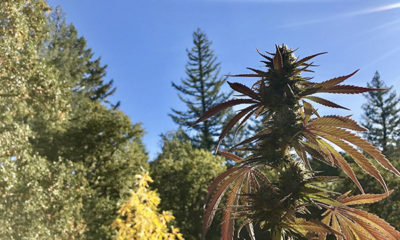
Joint Opinions
Will Legalization End the War on Weed? Doubtful.
With little over a month left until the new legalization laws in Washington and Colorado go into effect it seems everyone is throwing their hat in the ring to be the next big marijibusiness: from cannabis-based medical panacea peddlers to law enforcement, everyone wants their cut.
Two things that have become abundantly clear—legal recreational cannabis will absolutely change the medical systems in these states, as they exist today, and regulation of this legal industry will look no different than how the illegal industry was regulated as long as law enforcement is financially incentivized.
In Washington, medical marijuana dispensaries will become recreational storefronts where no mention of the therapeutic uses of cannabis will be allowed. Alison Holcomb, front woman of the I-502 legalization campaign in Washington conceded that it “made little sense” to run medical and recreational distribution centers (dispensaries) side by side.
The reality is, a clear divide between recreational use and medical use is upon us, and most advocates aren’t going to like it. Recreational will stay in the dispensaries; medical will be derived down into sprays, pills or other more palatable “medical” forms than bud and sold behind the counter in a pharmacy.
The rallying cry has always been an end to the War on Drugs, particularly the prohibition of cannabis in any form, including the non-psychoactive hemp. Legalization, however, will always be complicated by the industry, for better or worse. For better: in a legal market, medicinal-grade cannabis derivatives and recreational cannabis flowers, kiefs and waxes (or whatever you call what you have been smoking lately…) will all undergo testing in order to be approved for sale on the open market, and you can’t get into trouble for possessing it. For worse: the sheer value of a legal cannabis industry, estimated to be in the billions, by its very nature makes it subject to a legal and fiscal power grab, just like any other major industry worth billions of dollars.
But what if patients don’t want pharmaceutical cannabis? It’s a powerful argument for maintaining legal home growing and small patient collectives, not included in the Washington law, but unlikely to pass without constituents demanding it. In an example of why strong quality regulations by the Federal government should exist, is the drama that has been unfolding at RSHO, Dixie Botanicals and MJNA.
MJNA, aka Medical Marijuana Inc., was founded in 2009 after the Ogden Memo caused a boom in medical cannabis businesses in California and Colorado. MJNA, which is a publicly traded stock, has also been accused of being a “pump and dump” scheme, meaning they use public statements to create confidence and artificially inflate the price of the stock and then sell the cheaply purchased stock at a massive profit. Then they do that all over again.
MJNA includes two companies specializing in medical marijuana products, particularly high-CBDs now in high demand in the wake of Sanjay Gupta’s CNN special, Dixie Botanicals and Real Scientific Hemp Oil (RSHO). Both Dixie and RSHO have been accused of using low quality source product, which if that is the case, is likely to continue to go unregulated, as long as the “right” people are profiting from sales.
In a public statement, former Head of Science at Dixie Botanicals and Medical Marijuana Inc., Tamar Wise, claimed Dixie’s products were “unfit for human consumption” in a formal public statement:
“I’m tired of so called CBD companies claiming that what they provide is medicine. Anyone using a CBD from hemp product please be aware of what you’re actually getting b/c [sic] it is not what you think. These formulations start with a crude and dirty hemp paste (contaminated with microbial life! I have seen this and these organisms decompose the paste. The paste perhaps even contains residual solvent and other toxins as the extraction is done in China) made in a process that actually renders it unfit for human consumption. What these companies are doing is criminal and dangerous. In fact MJNA’s RSHO is literally just this hemp paste diluted in hemp seed oil. No refinement at all!!! And what Dixie Botanicals is offering is beyond disturbing. I cannot keep quiet any more. And since I formulated most of these products as head of Dixie science, I feel responsible for spreading the truth. I left Dixie for ethical reasons but it is not enough to just walk away. These frauds need to be exposed for what they are. Look out for my tell all article coming soon and feel free to contact me directly with questions as it is time to blow the whistle. Let’s keep this industry pure and safe.”
These companies have positioned themselves as legitimate pharmaceutical producers, and will likely be the first to be considered for sale in traditional pharmacies in the new recreational systems. These companies have savvy leaders, appealing, clean-cut stock images on professional websites and the right connections to stay out of trouble; they position themselves as part of the pharmaceutical industry, not the marijuana industry. If these quality claims are true, what is the worst that could happen? Fines? Nothing at all?
But, as we saw in early November, the worst that could happen for small-time (in comparison) domestic producers of recreational or medical cannabis is far worse: having your business gutted, destroyed and your cash taken at gunpoint.
The military-style raids that took place in California after the Ogden Memo and now in Colorado after the Cole Memo are evidence that even though the cannabis industry is moving above ground, paying taxes and for all intents and purposes becoming “legitimate” the Drug War profiteering will not stop at legalization.
Regulating the underground industry was, by nature, dangerous. Outlaws have weapons, and so regulating drug production was dangerous business that required expensive weapons and military-style equipment. Officers enacting these raids get hazard pay on top of their regular pay and sometimes even overtime or holiday pay in addition, depending on the time of the raids (that is up to four times the normal pay). But even more potent, these raids are a direct line to cash through forfeiture money.
“A recently disclosed email from AUSA Greg Parham of the Southern District of California is instructive,” says Eapen Thampy, Executive Director of Americans for Forfeiture Reform, “In it, Parham entirely repudiates the public stance of the Department of Justice by his superiors Andrew Birotte and Eric Holder by saying ‘… Congress would have to change the law before we would be dissuaded to discontinue our efforts.’ Indeed, with the prospect of forfeiture revenues still on the table, any cannabis-related business represents easy pickings for US Attorneys looking to pad their budgets in an atmosphere of federal fiscal uncertainty.”
There has yet to be a formal reason given for the raids in Colorado, although rumors include connections to Mexican drug cartels or crossing one of the eight lines drawn out in the Cole Memo. These restrictions are similar to those with the sale of recreational alcohol—dispensaries are not allowed to sell to minors or to send marijuana out of state. If they break these rules though, does it really justify a military-style raid? After all, these are licensed storefronts in residential and commercial communities that have voted to have them there.
So, will legalization bring about strict quality regulations for cannabis medicines? Probably not. Will legalization end the War on Weed? No, not as long as law enforcement sees dollar signs in regulating this above-ground industry. Legalization was just half the battle, now we need to shape an industry we would like to see.
Do you agree? Tell us in the comments below.






















